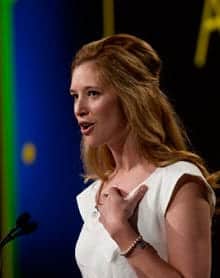By S.A. Swanson
Reprinted from The Rotarian — August 2012

Katie Ehlis, now a member of the Rotary Club of Denver Southeast, Colorado, USA, talks about attracting younger members to Rotary during a leadership training event. Rotary Images
A t 29, Katie Ehlis has ample experience founding clubs. She started the Rotaract Club of Thunder Bay in Ontario, Canada, when she was 19.
After moving to Minnesota, USA, she organized the Rotary Club of South Metro Minneapolis Evenings, and became its president, at 27. Chartered in June 2010, it has already achieved a goal that eludes many clubs: attracting young members. Most people in the club are in their 20s, and all are under age 40. Ehlis, now a member of the Rotary Club of Denver Southeast, Colo., and the director of learning and program development at the Red Robin restaurant chain, wants to continue bringing new blood to Rotary.
THE ROTARIAN: Do you feel pigeonholed as a recruiter of young members?
EHLIS: Yes. It’s true that Rotary needs younger members – in 2009, 11 percent of Rotarians were under 40. But I’m focused on recruiting for a new generation of Rotarian, and that isn’t necessarily about a specific age target. There are people who want to Skype into meetings and conferences when they can’t be there, and have other Rotary club members view that as acceptable. Also, I’m seeing a lot of potential members who want to be more involved in decision making from the get-go, versus the hierarchical model that says, “You’re a new member, so you won’t be a part of the board or anything until you’ve been here a couple of years.”
TR: Why did you start a new club in Minneapolis?
EHLIS: After I moved there for work, I started visiting the local clubs. The people were fantastic, but the club structures weren’t a good fit. I was getting started in my career, so showing up late to work once a week or taking two hours for lunch wasn’t going to fly. And the dues were high for someone with a starting salary.
TR: How did you make the new club different?
EHLIS: I wanted something affordable. There aren’t meals and beverages at meetings, so you don’t feel pressure to pay every week to partake in that. It helped us set dues fairly low, at US$265. Regular meetings are held in the evenings, but one meeting a month is a volunteer event, like helping at a local food shelf. Also, they meet at a hotel once a month to hear a speaker, and many people gather beforehand in the hotel bar, like a happy hour. The club does have high turnover, but it’s building passionate Rotarians. Even if people leave the club, once they get settled in the next city, they’re most likely going to join a club or start their own.
TR: Which is what you did recently.
EHLIS: When I started that club, I never thought I’d be moving from Minneapolis. Then I met my husband, Emerson, and he wanted to go to school in Denver, so we moved in June 2011. I found a great club – the Rotary Club of Denver Southeast – and the energy is like nothing I’ve seen. But I didn’t feel I was closing a door when I left, because I still have a close relationship with the club in Minneapolis.
TR: Did you meet your husband through Rotary?
EHLIS: We met at a Rotary happy hour. He wasn’t a Rotarian yet. And then the next week he decided he wanted to join. We laugh about it. He knew that if he was going to get to know me, he had to join the Rotary club.
Read more stories from The Rotarian or sign up for the digital edition.
Learn more about keeping Rotary program participants connected to Rotary.
